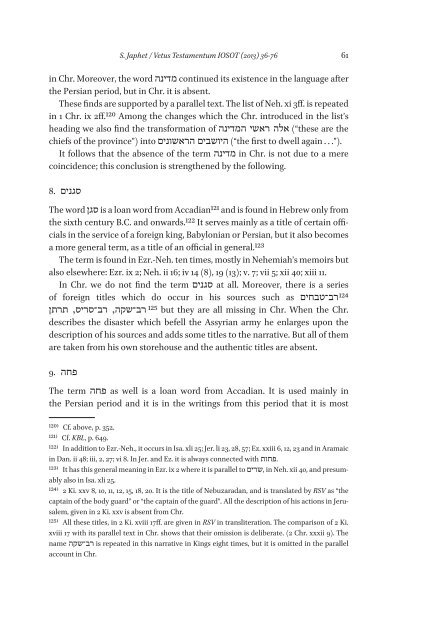Special Issue IOSOT 2013 - Books and Journals
Special Issue IOSOT 2013 - Books and Journals
Special Issue IOSOT 2013 - Books and Journals
Create successful ePaper yourself
Turn your PDF publications into a flip-book with our unique Google optimized e-Paper software.
S. Japhet / Vetus Testamentum <strong>IOSOT</strong> (<strong>2013</strong>) 36-76 61<br />
in Chr. Moreover, the word מדינה continued its existence in the language after<br />
the Persian period, but in Chr. it is absent.<br />
These finds are supported by a parallel text. The list of Neh. xi 3ff. is repeated<br />
in 1 Chr. ix 2ff.120 Among the changes which the Chr. introduced in the list’s<br />
heading we also find the transformation of אלה ראשי המדינה (“these are the<br />
chiefs of the province”) into היושבים הראשונים (“the first to dwell again . . .”).<br />
It follows that the absence of the term מדינה in Chr. is not due to a mere<br />
coincidence; this conclusion is strengthened by the following.<br />
סגנים .8<br />
The word סגן is a loan word from Accadian121 <strong>and</strong> is found in Hebrew only from<br />
the sixth century B.C. <strong>and</strong> onwards.122 It serves mainly as a title of certain officials<br />
in the service of a foreign king, Babylonian or Persian, but it also becomes<br />
a more general term, as a title of an official in general.123<br />
The term is found in Ezr.-Neh. ten times, mostly in Nehemiah’s memoirs but<br />
also elsewhere: Ezr. ix 2; Neh. ii 16; iv 14 (8), 19 (13); v. 7; vii 5; xii 40; xiii 11.<br />
In Chr. we do not find the term סגנים at all. Moreover, there is a series<br />
124 רב־טבחים of foreign titles which do occur in his sources such as<br />
Chr. 125 but they are all missing in Chr. When the רב־שקה, רב־סריס, תרתן<br />
describes the disaster which befell the Assyrian army he enlarges upon the<br />
description of his sources <strong>and</strong> adds some titles to the narrative. But all of them<br />
are taken from his own storehouse <strong>and</strong> the authentic titles are absent.<br />
פחה .9<br />
The term פחה as well is a loan word from Accadian. It is used mainly in<br />
the Persian period <strong>and</strong> it is in the writings from this period that it is most<br />
120) Cf. above, p. 352.<br />
121) Cf. KBL, p. 649.<br />
122) In addition to Ezr.-Neh., it occurs in Isa. xli 25; Jer. li 23, 28, 57; Ez. xxiii 6, 12, 23 <strong>and</strong> in Aramaic<br />
.פחות in Dan. ii 48; iii, 2, 27; vi 8. In Jer. <strong>and</strong> Ez. it is always connected with<br />
123) It has this general meaning in Ezr. ix 2 where it is parallel to ,שרים in Neh. xii 40, <strong>and</strong> presumably<br />
also in Isa. xli 25.<br />
124) 2 Ki. xxv 8, 10, 11, 12, 15, 18, 20. It is the title of Nebuzaradan, <strong>and</strong> is translated by RSV as “the<br />
captain of the body guard” or “the captain of the guard”. All the description of his actions in Jerusalem,<br />
given in 2 Ki. xxv is absent from Chr.<br />
125) All these titles, in 2 Ki. xviii 17ff. are given in RSV in transliteration. The comparison of 2 Ki.<br />
xviii 17 with its parallel text in Chr. shows that their omission is deliberate. (2 Chr. xxxii 9). The<br />
name רב־שקה is repeated in this narrative in Kings eight times, but it is omitted in the parallel<br />
account in Chr.








![Am HaSefer [Volk des Buches] - Books and Journals](https://img.yumpu.com/20648352/1/174x260/am-hasefer-volk-des-buches-books-and-journals.jpg?quality=85)







